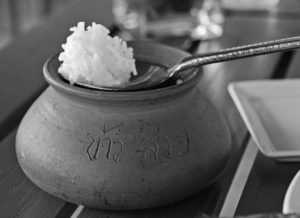Generosity First
December 1, 2017Podcast: Download (Duration: 4:56 — 2.3MB)
Subscribe: More
 In Thailand, children’s first exposure to Buddhism—after they’ve learned the gesture of respect—is in giving. As a monk comes past on his alms round, you see parents taking their children by the hand, lifting them up, and helping them put a spoonful of rice into the monk’s bowl. Over time, as the children start doing it themselves, the process becomes less and less mechanical, and after a while they begin to take pleasure in giving.
In Thailand, children’s first exposure to Buddhism—after they’ve learned the gesture of respect—is in giving. As a monk comes past on his alms round, you see parents taking their children by the hand, lifting them up, and helping them put a spoonful of rice into the monk’s bowl. Over time, as the children start doing it themselves, the process becomes less and less mechanical, and after a while they begin to take pleasure in giving.
At first this pleasure may seem counterintuitive. The idea that you gain happiness by giving things away
doesn’t come automatically to a young child’s mind. But with practice you find that it’s true. After all, when you give, you put yourself in a position of wealth. The gift is proof that you have more than enough. At the same time it gives you a sense of your worth as a person. You’re able to help others.
The act of giving also creates a sense of spaciousness in the mind, because the world we live in is created by our actions, and the act of giving creates a spacious world: a world where generosity is an operating principle, a world where people have more than enough, enough to share. And it creates a good feeling in the mind.
The whole idea that happiness has to consist either in doing things only for your own selfish motives or for other people to the sacrifice of yourself—the dichotomy between the two—is something very Western, but it’s antithetical to the Buddha’s teachings. According to the Buddha, true happiness is something that, by its nature, gets spread around.
The quality of generosity, what they call caga in Pali, is included in many sets of Dharma teachings. One is the set of practices leading to a fortunate rebirth. This doesn’t apply only to the rebirth that comes after death, but also to the states of being, the states of mind you create for yourself moment to moment, that you move into with each moment. You create the world in which you live through your actions.
By being generous—not only with material things but also with your time, your energy, your forgiveness, your willingness to be fair and just with other people—you create a good world in which to live. If your habits tend more toward being stingy, they create a very confining world, because there’s never enough. There’s always a lack of this, or a lack of that, or a fear that something is going to slip away or get taken away from you. So it’s a narrow, fearful world you create when you’re not generous, as opposed to the confident and wide-open world you create through acts of generosity.
At the same time you break down barriers. Monetary transactions create barriers. Somebody hands you something, you have to hand them money back, so there’s a barrier right there. Otherwise, if you didn’t pay, the object wouldn’t come to you over the barrier. But if something is freely given, it breaks down a barrier. You become part of that person’s extended family.
In Thailand the terms of address that monks use with their lay supporters are the same they use with relatives. The gift of support creates a sense of relatedness. The monastery where I stayed—and this includes the lay supporters as well as the monks—was like a large extended family. This is true of many of the monasteries in Thailand.
If there’s a connection of skillful behavior, a good connection is formed. This sort of positive connection starts with generosity, and grows with the gift of virtue. As the Buddha taught, when you hold to your precepts no matter what, with no exceptions, it’s a gift of security to all beings. You give unlimited security to everyone, and so you have a share in that unlimited security as well.
So this is what generosity does: It makes your mind more spacious and creates good connections with the people around you. It dissolves the boundaries that otherwise would keep the happiness from spreading around.
You find, of course, that you end up getting a lot more if you start with the attitude of giving. The mind is more up for challenges: “How about if I give it more time? How about meditating later into the night than I usually do? How about getting up earlier in the morning? How about giving more constant attention to what I’m doing? How about sitting longer through pain?”
The meditation then becomes a process of giving, and of course you still get the results. When you’re not so grudging of your efforts or time, you place fewer and fewer limitations on the process of meditation. That way the results are sure to be less grudging, more unlimited, as well. So it’s important that we develop the Noble Wealth of generosity to bring to our meditation.
The gift of being virtuous builds on the simple act of giving, and the gift of meditation builds on both.
- Generosity First - December 1, 2017
Quest Monthly Print Edition
Recent Issues
Latest Spiritual Reflection Posts
Weekly Newsletter
About
Quest for Meaning is a program of the Church of the Larger Fellowship (CLF).
As a Unitarian Universalist congregation with no geographical boundary, the CLF creates global spiritual community, rooted in profound love, which cultivates wonder, imagination, and the courage to act.
Contact
Church of the Larger Fellowship Unitarian Universalist (CLFUU)
24 Farnsworth Street
Boston MA 02210

